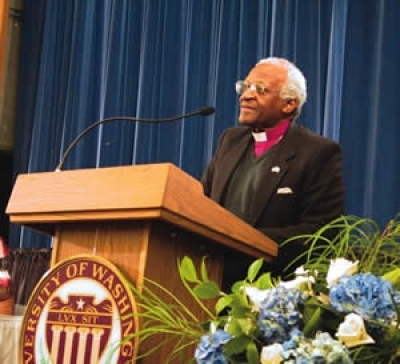Tutu: Muslim Anger Not Just About Cartoons
DOHA, Qatar (AP) - The furor over the Prophet Muhammad drawings is a small part of an expanding divide between Islam and the West, or what international leaders such as Archbishop Desmond Tutu described as the "symptom of a more serious disease."

Attending a U.N.-sponsored conference aimed at healing the deepening rift, Tutu and 19 other delegates agreed that key ways to bridge the chasm were reaching out to young people and providing more education. Even then, they agreed it would take years of dialogue and practical steps before the rift can be healed.
"What we face nowadays is not a clash of civilizations but a clash mostly caused by ignorance, arrogance, insensitivity and festering political differences that fuel hostilities," Turkish minister of state Mehmet Aydin said.
As the conference wrapped up Tuesday in this Persian Gulf state, more than 5,000 children ages 8 to 12 demonstrated in Karachi, Pakistan, at a rally organized by Pakistan's largest Islamic group. They chanted "Hang those who insulted the prophet!" and burned a coffin draped in American, Israeli and Danish flags.
Tutu, a retired Anglican archbishop from South Africa, said the drawings published last year by a Danish newspaper were just a sign of a far broader problem.
"What has happened and the aftermath has been seen as a symptom of a more serious disease," said Tutu, a Nobel Peace Prize winner. "Had relationships been different, one, the cartoons might not have happened, or if they had, they probably would have been handled differently."
Although the 12 drawings were first published last September, they have since been reprinted in other media, mostly Western, and have caused widespread demonstrations in the Muslim world. They have also become a rallying cry in the West for freedom of expression.
The European Union on Monday said that although it regretted the cartoons were "considered offensive" by Muslims, freedom of expression "is a fundamental right and an essential element of a democratic discourse."
Opinions like that angered former Iranian President Mohammad Khatami, who complained at the meeting that "we already have enough misunderstandings in our world today."
"Insulting the beliefs and customs of people and religions is not freedom of speech. This is not only related to Islam. We must respect the beliefs of other nations and religions whether we believe in them or not. If we don't believe or approve of them, we must challenge them through discussion and intellectual undertakings," he said.
Tutu noted that freedom of expression also came with some obligations.
"Imagine if the subject had been the Holocaust and it had been treated in a way that the Jews had deemed offensive and the reaction of the Danish government and international community had been as it is now," he said.
He lamented the negative stereotyping of Muslims and wondered why North Ireland's Protestants and Catholics, the Oklahoma City bombers or even the Nazis had never been labeled "Christian terrorists."
"Look at the Ku Klux Klan, who use a cross as their symbol and propagate hatred against others and encourage lynching. And yet we never hear someone say, 'There's an example of how Christianity encourages violence,'" Tutu said.
The group, which was meeting for the second time, said the divide also manifested itself in discrimination against immigrants, social and economic inequality and negative stereotyping.
Suggestions during three days of brainstorming and workshops included setting up a broad student-teacher exchange among nations, and facilitating technology and Internet access in poor communities





























